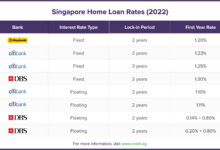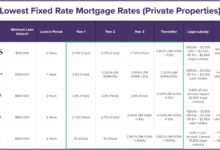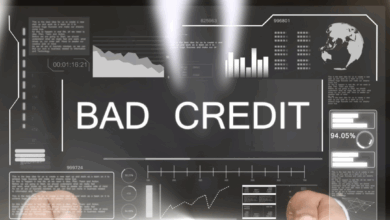Best Home Equity Loan Rates: Your Guide To Finding The Lowest Rates
When it comes to securing the best home equity loan rates, understanding the factors at play is crucial. From credit scores to economic conditions, this comprehensive guide will walk you through everything you need to know to make informed decisions.
Understanding Credit Scores
A credit score is a numerical representation of an individual’s creditworthiness, based on their credit history and financial behavior. It is calculated using a variety of factors, including payment history, credit utilization, length of credit history, types of credit used, and new credit accounts.
Importance of Having a Good Credit Score
- A good credit score is essential for obtaining favorable loan terms, such as lower interest rates and higher loan amounts.
- It can also impact other areas of your financial life, such as insurance premiums, rental applications, and even job opportunities.
Tips to Improve a Low Credit Score
- Make all payments on time to avoid late fees and negative marks on your credit report.
- Reduce credit card balances to lower your credit utilization ratio.
- Regularly check your credit report for errors and dispute any inaccuracies that could be dragging down your score.
Impact of Credit Score on Loan Approvals and Interest Rates
A higher credit score increases your chances of loan approval and allows you to qualify for lower interest rates, saving you money over the life of the loan.
Comparison of Different Credit Scoring Models
- The most commonly used credit scoring model is FICO, which ranges from 300 to 850.
- VantageScore is another popular model, with a range of 300 to 850, but it may weigh certain factors differently than FICO.
Common Misconceptions About Credit Scores
- Myth: Checking your credit score will hurt your credit.
This is false; checking your own credit score is considered a “soft inquiry” and does not impact your score.
- Myth: Closing old accounts will improve your credit score.
Actually, closing old accounts can shorten your credit history and negatively affect your score.
Factors Influencing Home Equity Loan Rates
When it comes to home equity loan rates, several factors come into play that can significantly impact the interest rates offered to borrowers. Understanding these factors is crucial for anyone considering taking out a home equity loan to make informed decisions.
Credit Scores
Credit scores play a vital role in determining the interest rates on home equity loans. Lenders use credit scores to assess the borrower’s creditworthiness and risk level. Generally, borrowers with higher credit scores are offered lower interest rates, while those with lower credit scores may face higher rates due to the perceived higher risk.
- Lenders typically consider credit scores above 700 as good, while scores below 620 are considered risky.
- Borrowers with excellent credit scores above 750 may qualify for the best home equity loan rates available.
- Improving your credit score before applying for a home equity loan can help you secure a more favorable interest rate.
Loan-to-Value Ratios
Loan-to-value ratios (LTV) also play a significant role in determining home equity loan rates. LTV ratio is calculated by dividing the amount of the loan by the appraised value of the property. The higher the LTV ratio, the riskier the loan is perceived by lenders, which can result in higher interest rates.
Lower LTV ratios, such as 80% or lower, are generally preferred by lenders and may lead to lower interest rates for borrowers.
Economic Conditions
Economic conditions, such as the state of the housing market and overall interest rate environment, can impact home equity loan rates. During periods of economic uncertainty or high interest rates, lenders may increase rates to mitigate risks. Conversely, in a stable economy with low-interest rates, borrowers may find more competitive rates for home equity loans.
- Fluctuations in the housing market can affect property values, which in turn impact LTV ratios and loan rates.
- Changes in government policies or economic indicators can also influence interest rates on home equity loans.
- Monitoring economic conditions and interest rate trends can help borrowers make strategic decisions regarding home equity loans.
Types of Home Equity Loans
When considering home equity loans, borrowers have the option to choose between fixed-rate and variable-rate loans. Each type has its own set of advantages and disadvantages, depending on individual financial goals and risk tolerance.
Fixed-Rate Home Equity Loans
Fixed-rate home equity loans offer stability and predictability, as the interest rate remains constant throughout the loan term. This means borrowers have the security of knowing exactly how much they need to pay each month, making budgeting easier. While the initial interest rate may be slightly higher than variable-rate loans, fixed-rate loans provide protection against potential rate hikes in the future. These loans are ideal for borrowers looking for long-term financial stability and planning for predictable payments over time.
Variable-Rate Home Equity Loans
Variable-rate home equity loans, on the other hand, have interest rates that can fluctuate based on market conditions. Initially, these loans may offer lower interest rates compared to fixed-rate loans, making them appealing for borrowers seeking short-term financial benefits or planning to pay off the loan quickly. However, the downside is that monthly payments can vary, making it harder to budget for the long term. Variable-rate loans are suitable for borrowers who are comfortable with some level of risk and are prepared to adjust their payments based on interest rate fluctuations.
Choosing the Right Loan Type
When deciding between fixed-rate and variable-rate home equity loans, it is essential to consider your financial goals and risk tolerance. If you prioritize stability and predictability, a fixed-rate loan may be the best option. On the other hand, if you are willing to take on some risk for the potential of lower initial rates, a variable-rate loan could be more suitable. Consulting with a financial advisor can help you determine the right loan type based on your individual circumstances.
| Aspect | Fixed-Rate Loan | Variable-Rate Loan |
|---|---|---|
| Interest Rate | Remains constant | Can fluctuate |
| Payment Structure | Predictable monthly payments | Payments may vary |
| Suitability | Long-term financial stability | Short-term financial benefits |
Finding the Best Home Equity Loan Rates
When looking for the best home equity loan rates, it’s essential to shop around and compare offers from multiple lenders. This process can help you secure the most competitive rates and terms for your specific financial situation.
Steps to Shop Around for the Best Rates
- Start by researching different lenders and financial institutions that offer home equity loans.
- Compare interest rates, loan terms, fees, and any other relevant factors that may impact the overall cost of the loan.
- Get personalized rate quotes from at least three different lenders to have a better understanding of the rates available to you.
- Consider working with a mortgage broker who can help you navigate the loan options and find the best rates based on your needs.
Importance of Comparing Offers from Multiple Lenders
- Comparing offers from multiple lenders can help you save money by identifying the most competitive rates and terms available in the market.
- It allows you to leverage offers from different lenders to negotiate better terms and rates that suit your financial goals.
- By exploring various options, you can make an informed decision and choose a loan that aligns with your budget and long-term financial plans.
Tips for Negotiating Better Rates with Lenders
- Improve your credit score before applying for a home equity loan to qualify for lower interest rates.
- Highlight your financial stability, income, and assets to demonstrate your creditworthiness to lenders.
- Consider offering a larger down payment or collateral to secure better rates and terms on your home equity loan.
- Negotiate with lenders by comparing offers and presenting competitive rates from other institutions to encourage them to match or beat those rates.
Resources for Finding the Most Competitive Home Equity Loan Rates
- Use online comparison tools to browse and compare rates from different lenders in your area.
- Check with local credit unions, banks, and online lenders to explore a wide range of loan options and rates.
- Consult with financial advisors or mortgage experts to get personalized recommendations on securing the best home equity loan rates.
- Stay updated on market trends and interest rate fluctuations to time your application for when rates are favorable for borrowers.
Understanding APR vs. Interest Rates
When it comes to home equity loans, understanding the Annual Percentage Rate (APR) versus the interest rate is crucial for making informed financial decisions. While the interest rate represents the cost of borrowing the principal loan amount, the APR encompasses the interest rate as well as any additional fees or charges associated with the loan.
Definition of APR
The Annual Percentage Rate (APR) is the total cost of borrowing expressed as an annual percentage. It includes not only the interest rate but also any fees, points, or other charges that the borrower may incur.
Importance of APR Comparison
– When comparing loan offers, focusing on the APR rather than just the interest rate can give you a more accurate picture of the total cost of the loan.
– Lenders are required to disclose the APR to borrowers, making it easier to compare loan offers and choose the most cost-effective option.
Impact of APR on Loan Cost
– A higher APR can significantly increase the overall cost of a loan, making it important to look for lower APR offers.
– By calculating the true cost of a home equity loan using the APR, borrowers can make informed decisions about their financial commitments.
Factors Affecting APR
– Factors such as credit score, loan amount, loan term, and the lender’s fees can influence the APR of a loan.
– Generally, borrowers with higher credit scores are likely to qualify for lower APRs.
Fixed APR vs. Variable APR
– A fixed APR remains constant throughout the loan term, providing predictable monthly payments.
– A variable APR can fluctuate based on market conditions, potentially leading to higher or lower monthly payments.
Savings with Lower APR
– Choosing a loan with a lower APR can result in significant savings over the life of the loan, reducing the total amount paid in interest.
Illustrative Table
| APR Rate | Monthly Payment |
|---|---|
| 4% | $1,200 |
| 6% | $1,300 |
| 8% | $1,400 |
Understanding the APR helped me realize that even a slight difference in percentage points can save me thousands of dollars in the long run.
Benefits of Low Home Equity Loan Rates
Securing a low interest rate on a home equity loan comes with several advantages that can greatly benefit homeowners. Lower rates can lead to significant savings over time, impacting both monthly payments and the overall equity in your home.
Impact on Monthly Payments
- Lower interest rates result in reduced monthly payments, making it easier for homeowners to manage their finances.
- By saving money on interest, borrowers can allocate more funds towards other expenses or investments.
- Having lower monthly payments can also provide a sense of financial security and stability.
Increase in Home Equity
- Low rates mean more of your monthly payment goes towards paying down the principal amount of the loan, which helps build equity in your home faster.
- As you pay off more of the principal balance, the value of your home increases, giving you more financial leverage for future needs or opportunities.
- Higher equity can also improve your overall financial standing and open up possibilities for additional borrowing or refinancing options.
Risks of Home Equity Loans with Low Rates
When considering home equity loans with low rates, it is important to be aware of the potential risks involved. While low rates may seem attractive initially, there are several factors to consider to ensure you make a well-informed decision.
Introductory Rates and Changes Over Time
Introductory rates on home equity loans with low rates may be enticing, but it is essential to understand that these rates can change over time. After the initial period, rates may increase significantly, leading to higher monthly payments and potentially financial strain for borrowers.
Risks of Adjustable-Rate Loans
Adjustable-rate home equity loans can be risky, especially in scenarios where interest rates rise unexpectedly. Borrowers may face difficulty in managing increased payments, leading to financial instability. It is crucial to assess your financial situation and risk tolerance before opting for an adjustable-rate loan.
Managing Risks
To manage risks associated with low-rate home equity loans, consider setting aside funds for potential rate increases, creating a budget to account for higher payments, and exploring fixed-rate loan options for stability. Stay informed about market trends and be prepared to refinance if necessary.
Negative Amortization
Negative amortization occurs when the monthly payment on a loan is insufficient to cover the interest due, resulting in the unpaid interest being added to the loan balance. This can lead to a higher loan amount over time and increased interest costs for borrowers.
Understanding Loan Terms and Conditions
It is crucial to read and understand the terms and conditions of the loan agreement before signing. Pay close attention to details such as prepayment penalties, fees, and potential rate adjustments to avoid any surprises in the future.
Consequences of Defaulting
Defaulting on a home equity loan with low rates can have serious consequences, including damage to your credit score, potential foreclosure on your home, and legal action by the lender. It is essential to make timely payments and communicate with your lender if you encounter financial difficulties.
Benefits of Refinancing
In certain circumstances, refinancing a low-rate home equity loan can be beneficial. If interest rates have decreased since you initially took out the loan, refinancing can help you secure a lower rate, reduce monthly payments, and potentially save money over the life of the loan.
Impact of Loan Term on Rates
When considering a home equity loan, the loan term plays a significant role in determining the interest rates offered to borrowers. The loan term refers to the length of time over which the borrower will repay the loan. Understanding how the loan term can impact interest rates is crucial for making an informed decision when selecting a home equity loan.
Relationship between Loan Term Length and Interest Rates
The length of the loan term is inversely related to the interest rates offered. In general, shorter loan terms tend to have lower interest rates compared to longer loan terms. Lenders typically view shorter loan terms as less risky since the borrower will be paying off the loan sooner, leading to lower interest rates.
Examples of Impact of Loan Term on Rates
For example, choosing a 15-year loan term may result in lower interest rates compared to a 30-year loan term. A shorter loan term may lead to higher monthly payments but lower overall interest costs, making it a more cost-effective option in the long run.
Selecting the Optimal Loan Term Based on Rates
When selecting the optimal loan term based on rates, borrowers should consider their financial situation, long-term goals, and ability to make monthly payments. It is essential to strike a balance between choosing a loan term that offers competitive interest rates while also ensuring that monthly payments are manageable.
Comparison of 15-year Mortgage vs. 30-year Mortgage Rates
A 15-year mortgage typically has lower interest rates compared to a 30-year mortgage. While a 15-year mortgage may result in higher monthly payments, borrowers can save significantly on interest costs over the life of the loan.
| Loan Term | Interest Rate |
|---|---|
| 10 years | 3.5% |
| 20 years | 4.0% |
| 30 years | 4.5% |
Variations in Interest Rates Based on Loan Terms
The table above illustrates hypothetical interest rates for different loan terms. As shown, shorter loan terms generally come with lower interest rates compared to longer loan terms. Borrowers can use this information to evaluate the impact of loan term length on interest rates and make an informed decision.
Influence of Economic Factors on Loan Term and Interest Rates
Economic factors such as inflation rates can influence the correlation between loan term and interest rates. In times of high inflation, shorter loan terms may be more attractive as borrowers can pay off the loan sooner and avoid higher interest costs associated with inflation.
Influence of Inflation Rates on Loan Term Attractiveness
Higher inflation rates can make longer loan terms less attractive due to the impact of inflation on the value of money over time. Borrowers may prefer shorter loan terms during periods of high inflation to mitigate the effects of inflation on their loan repayment.
Eligibility Criteria for the Best Home Equity Loan Rates
When it comes to securing the best home equity loan rates, meeting certain eligibility criteria is crucial. Lenders have specific requirements that borrowers need to fulfill in order to qualify for favorable rates. Let’s delve into the common eligibility criteria for obtaining the best home equity loan rates.
Credit History and Income
Having a strong credit history and stable income are key factors that lenders consider when evaluating borrowers for the best home equity loan rates. A good credit score demonstrates your ability to manage debt responsibly, while a steady income indicates your capacity to repay the loan. Lenders typically prefer borrowers with a credit score of 700 or higher and a debt-to-income ratio below 43%.
Tips for Improving Eligibility
To improve your eligibility for the best home equity loan rates, focus on maintaining a good credit score by making timely payments, reducing debt, and avoiding new credit applications. Increase your income if possible and pay off existing debts to lower your debt-to-income ratio. Lenders are more likely to offer favorable rates to borrowers with a strong financial profile.
Lender Evaluation Process
Lenders evaluate borrowers for favorable rates by assessing their creditworthiness, income stability, debt levels, and loan-to-value ratio. They may also consider the purpose of the loan and the borrower’s overall financial health. Being transparent about your financial situation and providing all required documentation can enhance your chances of securing the best home equity loan rates.
Home Equity Loan Rate Trends
Home equity loan rates can fluctuate based on various factors, making it essential to stay informed about current trends to secure the best rates possible.
Current Trends in Home Equity Loan Rates
Over the past year, home equity loan rates have shown a slight increase due to rising interest rates in the market. This trend is expected to continue as the economy recovers from the impact of the pandemic.
Key Economic Indicators Impacting Home Equity Loan Rates
- The Federal Reserve’s monetary policy
- Unemployment rates
- Inflation levels
- Housing market trends
Regional Variations in Home Equity Loan Rates
Home equity loan rates can vary significantly by region due to factors such as local economic conditions, housing market demand, and lender competition. For example, urban areas may have higher rates compared to rural areas.
Negotiating for Lower Home Equity Loan Rates
- Research and compare rates from multiple lenders
- Improve your credit score to qualify for lower rates
- Consider a shorter loan term for lower rates
- Negotiate with lenders based on your financial profile and market conditions
Fees and Charges Associated with Home Equity Loans
When obtaining a home equity loan, borrowers should be aware of the various fees and charges that may be involved in the process. These fees can significantly impact the overall cost of the loan and should be carefully considered before making a decision.
Origination Fees
Origination fees are charged by lenders to cover the cost of processing the loan. These fees typically range from 0.5% to 1% of the total loan amount and are added to the loan balance at closing.
Appraisal Fees
Appraisal fees are required to assess the value of the property being used as collateral for the loan. These fees can vary depending on the size and location of the property, but typically range from $300 to $500.
Closing Costs
Closing costs include various fees such as title search, attorney fees, and recording fees. These costs can add up to 2% to 5% of the loan amount and are typically paid at the time of closing.
Prepayment Penalties
Some lenders may charge prepayment penalties if the borrower pays off the loan early. These penalties can vary but are usually a percentage of the remaining balance or a certain number of months’ worth of interest.
To minimize fees when obtaining a home equity loan, borrowers can negotiate with lenders to lower or waive certain fees, compare offers from multiple lenders to find the best deal, and carefully review the terms and conditions of the loan agreement to avoid unexpected charges. By understanding the breakdown of typical fee ranges for each category, borrowers can better prepare for the costs associated with a home equity loan.
Using Home Equity Loan Calculators
When considering a home equity loan, it’s important for borrowers to have a clear understanding of the costs involved. This is where home equity loan calculators can be incredibly helpful in estimating expenses and planning for the future.
How Loan Calculators Help Borrowers
Using a home equity loan calculator allows borrowers to input key information such as loan amount, interest rate, loan term, and any additional fees. The calculator then generates an estimate of monthly payments, total interest paid, and other important details. This helps borrowers make informed decisions about their loan options and budget effectively.
- Loan amount
- Interest rate
- Loan term
- Additional fees (if any)
Popular Online Calculators for Comparing Rates
There are several reputable online calculators that borrowers can use to compare home equity loan rates from different lenders. Some popular options include Bankrate, NerdWallet, and LendingTree. These calculators provide a user-friendly interface and detailed breakdown of costs to help borrowers evaluate their options.
Tips on Interpreting Calculator Results
It’s important to consider the total cost of the loan over time, including interest and fees, not just the monthly payment amount.
When using a home equity loan calculator, pay attention to the total interest paid over the life of the loan, as well as any potential changes in interest rates. This information can help borrowers assess the affordability of the loan and choose the best option for their financial situation.
Leveraging Home Equity Loan Rates for Financial Goals
When it comes to achieving financial goals, leveraging home equity loan rates can be a powerful tool. By taking advantage of favorable rates, you can make significant progress towards your objectives. Whether it’s debt consolidation, home improvements, or other financial needs, smart utilization of home equity loans can help you reach your goals faster.
Debt Consolidation
- Consolidating high-interest debt: Use a home equity loan to pay off credit cards, personal loans, or other debts with higher interest rates. This can save you money on interest payments and simplify your finances.
- Lower monthly payments: By combining multiple debts into one home equity loan, you may be able to reduce your monthly payment amount, providing more breathing room in your budget.
- Improved credit score: Paying off high-interest debt with a home equity loan can positively impact your credit score over time, as long as you make timely payments.
Home Improvements
- Increasing property value: Using a home equity loan for renovations or upgrades can raise the value of your home, potentially leading to a higher resale value in the future.
- Enhanced comfort and enjoyment: Investing in home improvements can make your living space more comfortable and enjoyable for you and your family, enhancing your quality of life.
- Tax-deductible interest: In some cases, the interest paid on a home equity loan used for home improvements may be tax-deductible, providing additional financial benefits.
Avoiding Pitfalls
- Borrowing more than you need: Be cautious not to borrow more than necessary, as it can lead to higher debt levels and financial strain in the long run.
- Defaulting on payments: Make sure you can afford the monthly payments on your home equity loan to avoid defaulting, which can result in the loss of your home.
- Ignoring other financial goals: While leveraging home equity loan rates can be beneficial, don’t neglect other important financial goals such as retirement savings or emergency funds.
Regulatory Considerations for Home Equity Loans
When it comes to home equity loans, it’s important to be aware of the regulatory landscape that governs these financial products. Understanding the regulations can help you make informed decisions and protect your interests as a borrower.
Regulatory changes can have a significant impact on loan rates and terms. For example, new regulations may require lenders to adjust their pricing or underwriting criteria, which could affect the rates offered to borrowers. It’s essential to stay updated on any regulatory developments that may influence the home equity loan market.
Consumer Protections for Home Equity Borrowing
- Consumer protections ensure that borrowers are treated fairly and have access to transparent information about their loans.
- Regulations may stipulate disclosure requirements for lenders, such as providing clear information on rates, fees, and terms.
- Consumer protections also include safeguards against predatory lending practices, helping to prevent borrowers from being taken advantage of.
Staying Informed about Regulatory Developments
- Keep an eye on updates from regulatory agencies such as the Consumer Financial Protection Bureau (CFPB) for any changes in rules or guidelines.
- Consult with financial advisors or experts to understand how regulatory changes may impact your home equity loan options.
- Stay informed through reputable financial news sources to stay ahead of any regulatory shifts that could affect your borrowing decisions.
Closing Notes
Now that you have a better grasp of how home equity loan rates work, you’re equipped to navigate the borrowing landscape with confidence. Whether you’re looking to renovate your home or consolidate debt, finding the lowest rates is key to maximizing your financial goals.







